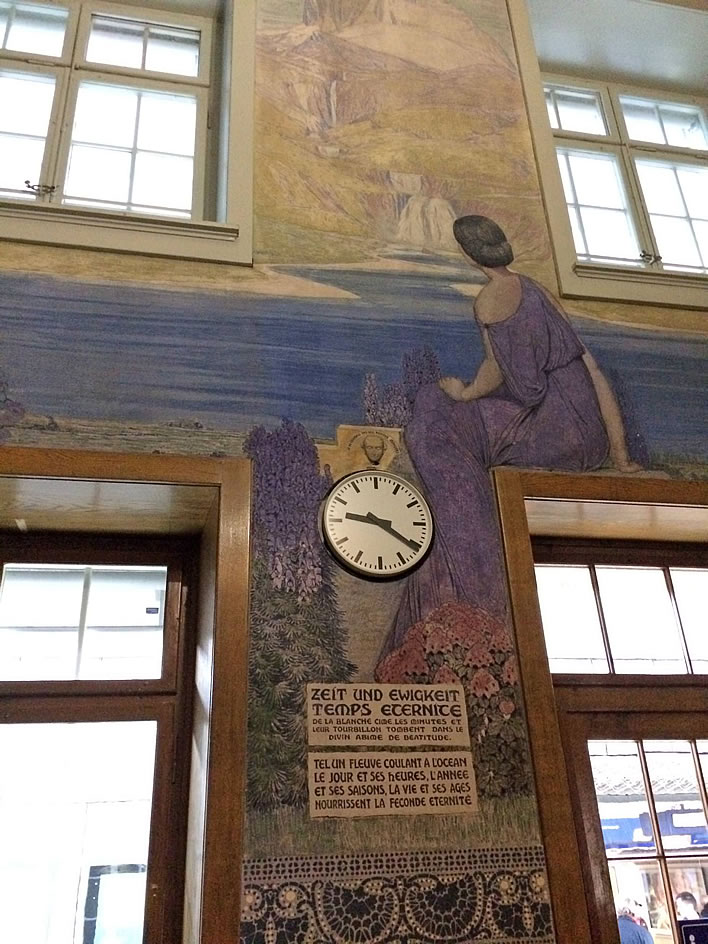Over the waterfall
Richard Law, UTC 2020-03-02 12:52
A sensible piece in the UK Daily Telegraph reminds us that for those who suffer some traumatic event, the worst thing that can happen afterwards is to keep talking about it. The brain's natural response to an unpleasant event is to forget it. Forgetting is not a lack of piety, but a natural process of healing.
The modern craze for talking about such things calls itself therapy, but in reality, repeatedly recycling, reanimating and reinterpreting the event does not heal the wound but only gouges at it.
Immediately after the present moment, time flows over the waterfall and takes everything from that present with it. That 'present-that-was', the past, no longer exists. You cannot revisit it. You cannot change it.

The Swiss artist Philippe Robert (1881-1930) painted a series of murals in the waiting-room of the Biel/Bienne railway station. The key mural, shown here, is a metaphoric and philosophical treatment of time. Beneath the title panel underneath the clock we find a text describing the scene: De la blanche cime les minutes et leur tourbillon tombent dans le devin abîme de béatitude, 'From the white peak the minutes and their whirlpools fall into the divine chasm of beatitude'. A fuller description of Robert's remarkable murals can be found in our 2018 article about Swiss waiting-room murals.
Image: ©Katja Baigger / NZZ. [Click on the image to display a large version in a new tab.]
Some apparitions of that moment may hang around in our inaccurate memories, but they, like the shades of the dead which the Greeks believed spooked powerlessly – lifelessly, ineffectually – around Hades, are mere shadows, which, left to themselves, will soon evaporate in the sunlight of the present.
Summoning and re-summoning these feeble, powerless memories by means of therapeutic rites will never heal anyone. Pouring blood into the trench and summoning the shades is mere necromancy, not piety.
Good advice for the elderly, too, who twist in the 'rending pain of re-enactment / Of all that you have done and been' (©Eliot, Little Gidding, II). All these things that now torture you passed over the waterfall long ago. After self-examination has fulfilled its purpose you must allow the horrid shadows which they left behind in your memory to follow them into oblivion.
If you still hesitate to banish these spooks, watch Krapp's Last Tape (1958), a play of great profundity created by the genius Samuel Beckett when he was fifty-two.
Using the dramatic device of a tape recorder, Beckett overlays the past and present of the sixty-nine-year-old Krapp. We may be haunted by memories, but Krapp has his earlier self on tape. Listening to it is the purest torture for him, that 'rending pain of re-enactment', made more rending by its unnatural immediacy. He cannot resist scratching the wounds, which are made deeper by every hearing, but wishes only for some final release.
Krapp's Last Tape, performed by Patrick Magee in a BBC recording from 1972. There are numerous other performances available on YouTube, of course.
0 Comments UTC Loaded:
Input rules for comments: No HTML, no images. Comments can be nested to a depth of eight. Surround a long quotation with curly braces: {blockquote}. Well-formed URLs will be rendered as links automatically. Do not click on links unless you are confident that they are safe. You have been warned!